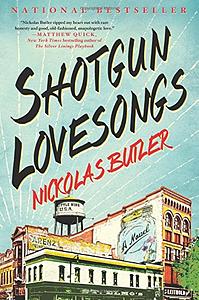You need to sign in or sign up before continuing.
Take a photo of a barcode or cover
hopeful
inspiring
reflective
relaxing
medium-paced
Plot or Character Driven:
Character
Strong character development:
Yes
Loveable characters:
Yes
Diverse cast of characters:
No
Flaws of characters a main focus:
Yes
lighthearted
reflective
fast-paced
Plot or Character Driven:
Character
Strong character development:
Yes
Loveable characters:
Yes
Diverse cast of characters:
No
Flaws of characters a main focus:
Yes
Slow and almost melodic. No huge twists in the plot - instead a very steady unraveling of the history of 4 friendships. Nicely captures both the intense love of a small town and the intense need to get away. It took me a while to really get into it but by the end I was very satisfied.
This plain, unadorned story hides a thoughtful weave of emotions and loyalties. Grabbed from the library shelf, I really enjoyed this relaxed, companionable tale. I'm not generally a fan of multiple POV's, but it worked for this tale, with each character having a recognisable style of style of writing. It's delightful in it's simplicity.
Favourite quote
"What he could have said is, I know you better than you know yourself.
And this, I think, is what marriage is all about."
Favourite quote
"What he could have said is, I know you better than you know yourself.
And this, I think, is what marriage is all about."
Brought me back to my days at UWEC. Loved all of the beautiful details about Eau Claire and the surrounding area. The character Leland is 100% inspired by Bon Iver/Justin Vernon. Fun read about how friendships change over time.
Great read by a Wisconsin author. The story line is divided up between the main characters. Some of the dialogue waxes a bit poetic for some of the characters, but I didn't mind it so much. I think Butler is probably a good poet. The best part is, wherever you think the story is going, it isn't. Nicely done.
You can read my entire review and click links to book here on my blog, HERE WE ARE GOING, http://herewearegoing.wordpress.com/2014/04/14/reading-shotgun-lovesongs-by-nickolas-butler/
Shotgun Lovesongs by Nickolas Butler
Full disclosure: I’ve an unreasonable, irrational and slightly preposterous grudge against those authors who’ve attended the Iowa Writers’ Workshop, and those writers whose debut novels are the subject of bidding wars and sold to filmmakers, and those authors who are published by particular imprints, one of which is St Martin’s Press — even though I know it is now a subsidiary of one of the five publishing behemoths and means virtually nothing — still, these things incur in me enmity, resentment, even, I am ashamed to admit, malice and rancor. So, it is the bad luck (or good fortune) of Nickolas Butler that he falls into all of the above categories.
Shotgun Lovesongs is Mr. Butler’s debut novel, begun during his study at the Iowa Workshop, published by St. Martin’s (otherwise known as Macmillan Publishers) and — dammit to hell — it’s awfully good.
You ought really to go HERE to Mr. Butler’s very own website, where there are links to reviews about the book and author profiles.
This debut novel is an orgy of bildungsroman about a group of friends fated to tight-knittedness by the nature of small-town American life. The novel has been heralded as a throwback love-story absent the snarky irony of so much modern lit, and, it’s true, Lovesongs – on its surface – limns an unadorned tale of the various trajectories and machinations of this group of friends as they head for a the pile-up-slam-demolition derby of early-middle-life wondering and wandering that results in the question, “How much choice did I really have in this me I have become?”
Be warned, this wandering and wondering is the tale of America, abstracted using the town of Little Wing as microcosm. Too, Little Wing’s large, looming, never much used, long neglected and now, nearly disastrously restored mill, a town guarding sentinel which characters frequently ascend, gazing over the town whilst thinking and conversing deeply about “life” or, to consider hurtling themselves to the ground, serves as symbolic center for the decline and fall and shoring up of a world meant to be portrayed as worth keeping, worth living in, worth returning to, worth staying for.
I’m not so sure of that premise.
Told by a quintet of first person narrators, this is a love story; not so much between two people — though there are elements of romance — but, rather, one of those love stories that occur between groups of dear, long friends who survive the ups, downs, nearnesses, distances, changes, petty and not so petty grievances and betrayals, and manage to discover that they are forever joined, forever bound, a soul family.
Having lived long enough, one learns that becoming family — truly accepting the foreverness of such a bond — comes only with the accumulation of courage enough to accept what is. There is a great deal in this novel about forgiveness, the journey there, but forgiving is only the first step in becoming one with another (or others) — forgiveness still implies judgment, whereas real acceptance is born of a unity beyond judging, it is a matter of being able to live with the “all that is” of those others, and knowing they will reciprocate.
These people come together and go their separate ways and re-unite and stay and leave and love and cheat and disappoint and betray and apologize and literally take a bullet and suffer brain damage and near freeze to death for their troubles, they are rich and poor and talented and not-so-much and famous and unknown and — the gamut of a particular white-hetero-privileged world that is spending a lot of time nowadays wondering why it isn’t all it was cracked up to be, not quite what they were promised.
But, still and all the while, Little Wing remains at the center of who they are. Dammit. Yes, it does. Forgive me my snarky irony. I really did like this book. Mr. Butler really is a gifted prose stylist. But, the central conflict between three of its characters struck me as a soapy sort of conceit. I can’t get all excited over who had sex with whom and who told whom in the sort of bro-code way that causes relationship implosion in the last half of this novel. I get the whole “it was a betrayal not to tell me even though it wasn’t technically cheating” thing — but, I think it’s an idiotic, demeaning patriarchal throwback a opposed to justification for behavior so — when late in the story a man with a gun showed up — I was hoping he’d have better aim.
Then again, Mr. Butler went to Iowa Workshop and sold the movie rights and is all the rage. And I’m on top of a mill of my own thinking about jumping . . . so, read the book. Decide for yourself.
Shotgun Lovesongs by Nickolas Butler
Full disclosure: I’ve an unreasonable, irrational and slightly preposterous grudge against those authors who’ve attended the Iowa Writers’ Workshop, and those writers whose debut novels are the subject of bidding wars and sold to filmmakers, and those authors who are published by particular imprints, one of which is St Martin’s Press — even though I know it is now a subsidiary of one of the five publishing behemoths and means virtually nothing — still, these things incur in me enmity, resentment, even, I am ashamed to admit, malice and rancor. So, it is the bad luck (or good fortune) of Nickolas Butler that he falls into all of the above categories.
Shotgun Lovesongs is Mr. Butler’s debut novel, begun during his study at the Iowa Workshop, published by St. Martin’s (otherwise known as Macmillan Publishers) and — dammit to hell — it’s awfully good.
You ought really to go HERE to Mr. Butler’s very own website, where there are links to reviews about the book and author profiles.
This debut novel is an orgy of bildungsroman about a group of friends fated to tight-knittedness by the nature of small-town American life. The novel has been heralded as a throwback love-story absent the snarky irony of so much modern lit, and, it’s true, Lovesongs – on its surface – limns an unadorned tale of the various trajectories and machinations of this group of friends as they head for a the pile-up-slam-demolition derby of early-middle-life wondering and wandering that results in the question, “How much choice did I really have in this me I have become?”
Be warned, this wandering and wondering is the tale of America, abstracted using the town of Little Wing as microcosm. Too, Little Wing’s large, looming, never much used, long neglected and now, nearly disastrously restored mill, a town guarding sentinel which characters frequently ascend, gazing over the town whilst thinking and conversing deeply about “life” or, to consider hurtling themselves to the ground, serves as symbolic center for the decline and fall and shoring up of a world meant to be portrayed as worth keeping, worth living in, worth returning to, worth staying for.
I’m not so sure of that premise.
Told by a quintet of first person narrators, this is a love story; not so much between two people — though there are elements of romance — but, rather, one of those love stories that occur between groups of dear, long friends who survive the ups, downs, nearnesses, distances, changes, petty and not so petty grievances and betrayals, and manage to discover that they are forever joined, forever bound, a soul family.
Having lived long enough, one learns that becoming family — truly accepting the foreverness of such a bond — comes only with the accumulation of courage enough to accept what is. There is a great deal in this novel about forgiveness, the journey there, but forgiving is only the first step in becoming one with another (or others) — forgiveness still implies judgment, whereas real acceptance is born of a unity beyond judging, it is a matter of being able to live with the “all that is” of those others, and knowing they will reciprocate.
These people come together and go their separate ways and re-unite and stay and leave and love and cheat and disappoint and betray and apologize and literally take a bullet and suffer brain damage and near freeze to death for their troubles, they are rich and poor and talented and not-so-much and famous and unknown and — the gamut of a particular white-hetero-privileged world that is spending a lot of time nowadays wondering why it isn’t all it was cracked up to be, not quite what they were promised.
But, still and all the while, Little Wing remains at the center of who they are. Dammit. Yes, it does. Forgive me my snarky irony. I really did like this book. Mr. Butler really is a gifted prose stylist. But, the central conflict between three of its characters struck me as a soapy sort of conceit. I can’t get all excited over who had sex with whom and who told whom in the sort of bro-code way that causes relationship implosion in the last half of this novel. I get the whole “it was a betrayal not to tell me even though it wasn’t technically cheating” thing — but, I think it’s an idiotic, demeaning patriarchal throwback a opposed to justification for behavior so — when late in the story a man with a gun showed up — I was hoping he’d have better aim.
Then again, Mr. Butler went to Iowa Workshop and sold the movie rights and is all the rage. And I’m on top of a mill of my own thinking about jumping . . . so, read the book. Decide for yourself.
emotional
reflective
slow-paced
Plot or Character Driven:
Character
Strong character development:
Yes
Loveable characters:
Complicated
Diverse cast of characters:
N/A


